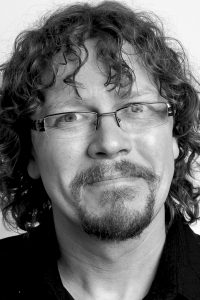
© M.F.Schorro
Thomas Sandoz [Switzerland]
Thomas Sandoz was born in Neuchâtel, Switzerland, in 1967. He studied epistemology and psychology, received his doctorate from the University of Lausanne, and published several novels, monographs, and essays. He also became known for his popular science articles and cultural criticism as well as several stage works.
In many of his novels, Sandoz immerses himself in the emotional world of his characters, who are often lonely and struggling with grief, illness, and fear. Awarded the Swiss Schiller Foundation Prize in 2011, »Même en terre« (2012; tr: Rest Gently) tells the story of the lonely, taciturn gardener of a municipal cemetery, who is responsible for the children’s graves. He cultivates a special relationship with the graves he is responsible for, gives flower names to all those who died prematurely, brings gifts and toys, and seems to want to compensate for something he was denied as a child. When the cemetery is to be restructured, his world is threatened. It calls for extreme measures: he wants to buy a remote piece of land to give his protégés a new home.
After »Les temps ébréchés« (2013, tr: Rough Times), in which a young woman who goes deaf learns the basics of music, and »Malenfance« (2014, tr: Malignancy), which tells the story of a little boy who travels through cities and mountains far away from his turbulent family life, Sandoz writes about a road trip in his satire »La balade des perdus« (2018; tr: The Balad of the Lost Souls). Four young teenagers travel in a minibus along the roads of the Alps in summer. Their caregiver is also on board, as all four are disabled. A few months earlier, one of them, Luc, took part in an online psychology forum under a false identity and involuntarily advised a minister on a controversial health reform, causing the media to rush to the hunt for a supposed guru. On their way to the ministerial office, they find themselves in all sorts of adventures, and are confronted above all with the reality of a society in which performance and productivity are the norm, forcing the protagonists to find their own sense of existence.
The central theme of Sandoz’s novel »Croix de bois, croix de fer« (2016; tr: Wooden Cross, Iron Cross) is charity towards others. After the early death of his brother, a missionary, a man is invited to a memorial. Looking back on his own childhood and youth, he recalls how his brother proudly continued in the missionary tradition of the family, and how he always accused him of not having become a doctor or a teacher. Now, at the symposium, he wants to reveal his brother’s true motivations and take stock of his own life.
In addition to his work as a writer, Sandoz works as a cultural mediator and, among other activities, conducts writing workshops for young people with difficulties at school.
The author lives in the canton of Neuchâtel.
Bibliography
99 minimes
L’Âge d’Homme
Lausanne, 1997
Gerb
L’Âge d’Homme
Lausanne, 2000
La vraie nature de l’homéopathie
Presses universitaires de France
Paris, 2001
Déprimé ou dépressif?
Grolley
L’Hèbe, 2001
La Fanée
[Ill: Catherine Louis]
G d’Encre
Le Locle, 2008
Les temps ébréchés
Grasset
Paris, 2013
Malenfance
Grasset
Paris, 2014
Croix de bois, croix de fer
Grasset
Paris, 2016
La balade des perdus
Grasset
Paris, 2018
Ruhe sanft
die brotsuppe
[Ü: Yves Raeber]
Biel, 2018
